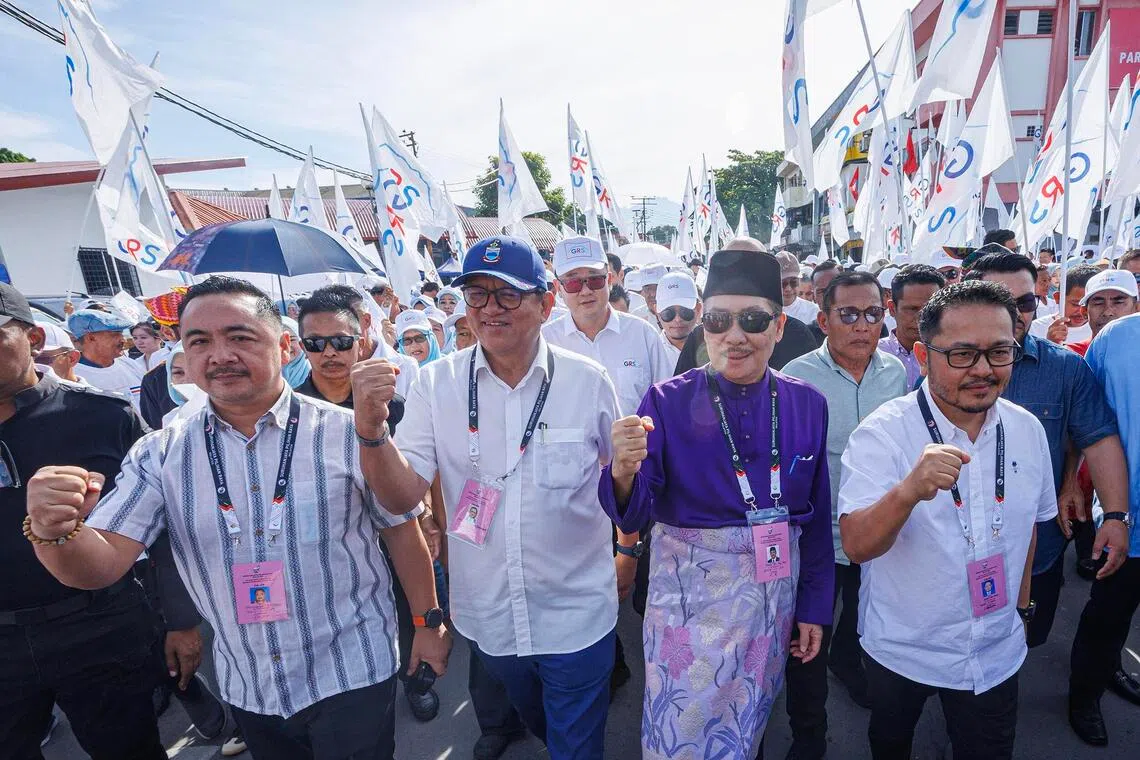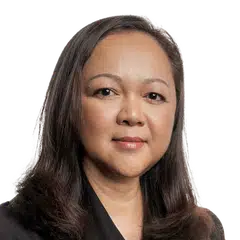Sabah state election set to see a fierce fight with record number of candidates
Sign up now: Get insights on the biggest stories in Malaysia

Sabah's caretaker Chief Minister Hajiji Noor (in blue) marching with Gabungan Rakyat Sabah supporters to the nomination centre on Nov 15, ahead of the Nov 29 state polls.
PHOTO: THE STAR/ASIA NEWS NETWORK
Follow topic:
- Sabah's upcoming state election features a record 596 candidates vying for 73 seats, with Tulid seeing 14 candidates.
- Dynasties dominate Sabah politics due to local loyalty and grievances over resource management. The Aman, Apdal, Bahanda and Kitingan families are notable names.
- Sabah, despite producing 41 per cent of Malaysia's crude oil and 18 per cent of its natural gas, remains one of the poorest states..
AI generated
KUALA LUMPUR – The upcoming state election in Sabah
As nominations for the 17th Sabah state election closed on Nov 15, 596 candidates will be gearing up to vie for 73 seats on Nov 29 – with all seats set to see a four-cornered fight at the very least, which is uncommon in electoral politics in Peninsular Malaysia.
In the most crowded face-off, 14 candidates will battle it out for the single seat of Tulid, while four other constituencies will each be contested by 13 candidates.
At the close of nominations, the candidates confirmed include 74 independents, 73 from Parti Warisan, 72 from Parti Impian Sabah, 55 from Gabungan Rakyat Sabah (GRS), 46 from Parti Solidariti Tanah Airku (Star), 45 from Barisan Nasional (BN), 42 from Perikatan Nasional (PN), and 40 from Parti KDM.
Malaysian Prime Minister Anwar Ibrahim’s Pakatan Harapan (PH) alliance has fielded 22 candidates.
The Election Commission said 525 of the candidates are men and 71 are women. The youngest is 24, while the oldest is 86.
Sabah’s political scene is a crowded one with some 20 parties, and is also marked by personality politics, frequent defections and the dominance of political dynasties.
Asian studies professor James Chin of the University of Tasmania predicts that 95 per cent of the candidates will lose their deposits due to their large number.
Also, the upcoming polls, even more so than previous ones, will be dominated by the family members of lawmakers, political party founders and officials scattered across rival coalitions.
The dynastic nature of the race reflects not merely political culture, analysts say, but also Sabah’s longstanding grievances with Peninsular Malaysia. Many voters see local family-based leaders as defenders of state rights, especially over oil royalties and resource management, which has historically allowed political families to maintain a loyal base.
There is growing resentment that Sabah, which produces about 41 per cent of Malaysia’s crude oil and 18 per cent of its natural gas, remains one of the poorest states
In October, a landmark High Court ruling ordered Kuala Lumpur to return over 40 per cent of the federal revenue derived from the Borneo states, in line with the constitutional promise made during Malaysia’s founding years. The sum runs into billions of ringgit.
But in a rare occurrence, the federal government has yet to appeal against the decision, for fear of sparking anger among the electorate. Datuk Seri Anwar on Nov 15 said in Sabah that the federal government respected the decision of the court, and that the Finance Ministry and relevant agencies would hold a meeting on Nov 17 to finalise a fresh recalculation and discuss the matter.
The polls for Malaysia’s second-largest state by land size involve three main factions: the GRS-PH bloc, BN Sabah and Parti Warisan.
A fourth faction, the PN opposition coalition, led by Malay-Muslim-based parties from Peninsular Malaysia, is not expected to make much headway because of its religion and race platform.
Sabah’s political coalitions are leaning heavily on the inherited networks, fielding candidates with established family connections.
At the upcoming election, at least seven members of Sabah governor Musa Aman’s extended family will be in the running.
His sons, brother, nephews and son-in-law are contesting seats across rival parties, underscoring the family’s deep presence in the state’s political landscape.
Tun Musa’s eldest son, Datuk Yamani Hafez Musa, 48, who is Malaysia’s former deputy finance minister II, is making his state election debut for Mr Anwar’s Parti Keadilan Rakyat, while his younger son, Datuk Hazem Mubarak Musa, 43, is contesting in another constituency under rival GRS’ banner.
The governor’s younger brother, son-in-law and a nephew will also be running under GRS, while another nephew is contesting under Star’s ticket.
Prof Chin noted that the state’s politics have long revolved around powerful families. Community ties, longstanding patronage networks and individual reputations often matter more than party lines here, he told The Straits Times.
“Politics in Sabah revolve more around personalities than party loyalty,” he said, adding that family networks play a crucial role as most of the state’s prominent families consolidated their power within a single stronghold.
While the Aman family is the most high-profile, they are not the only visible clan in the polls.
There are also the Apdals. Multi-ethnic Parti Warisan founder-president Shafie Apdal
Sabah could also see more of the Bahanda siblings of the Rungus ethnic group from northern Sabah. The state polls will offer up a three-way sibling rivalry on different tickets: Datuk Verdon Bahanda is leading a slate of so-called “black wave” or independent candidates contesting 17 constituencies; his brother Wetrom Bahanda is standing under the banner of Parti Kesejahteraan Demokratik Masyarakat, a small party with strong support in southern Sabah; and their sister Redonah Bahanda, political secretary to caretaker Chief Minister and GRS chief Hajiji Noor, is running on a GRS ticket.
Then there is the Kitingan family, which remains a viable political force. Former Sabah chief minister Joseph Pairin Kitingan retired from politics some years back, but his brother Jeffrey Kitingan, the current Deputy Chief Minister of Sabah and president of Star, is contesting in the upcoming state polls.
However, some question whether the presence of political dynasties has hindered political renewal in the state.
The concentration of wealth and influence among a few families in Sabah means long-term political renewal is challenging.
“Long-term renewals in Sabah are probably not possible until the day when wealth is more widely spread. As long as wealth and influence is concentrated in the top 2 per cent or 3 per cent, you don’t expect certain things to change,” said Prof Chin.
Of the 79 seats in Sabah’s state Legislative Assembly, 73 must be contested, while another six will be appointed by the governor.
More than 1.7 million Sabahans are set to cast their votes on Nov 29. Early voting is scheduled for Nov 25 and confirmed candidates can begin campaigning for 14 days, until 11.59pm on Nov 28.


